Common Law Assignment: Business Law and Ethics Case Study Analysis
VerifiedAdded on 2020/03/01
|7
|1543
|112
Case Study
AI Summary
This case study analyzes a business law and ethics scenario involving Mikaela, a baker, and her clients and suppliers. The assignment addresses key issues related to contract law, including the determination of contractual terms, the inference of implied terms, the distinction between conditions and warranties, and the application of exclusion clauses. The analysis examines the gluten-free almond flour statement, the implied term of a gluten-free wedding cake, the blue icing color as a warranty, and Mikaela's liability regarding the exclusion clause. The solution applies relevant legal principles from cases like Birch v Paramount Estates Ltd, Heilbut, Symons & Co v Buckleton, Shirlaw v Southern Foundries, Moorcock, Poussard v Spiers and Pond, and Chapelton v Barry UDC to provide comprehensive answers to the posed questions, offering a detailed understanding of contract law principles and their practical application.

Word Count: 1478
Paraphrase This Document
Need a fresh take? Get an instant paraphrase of this document with our AI Paraphraser
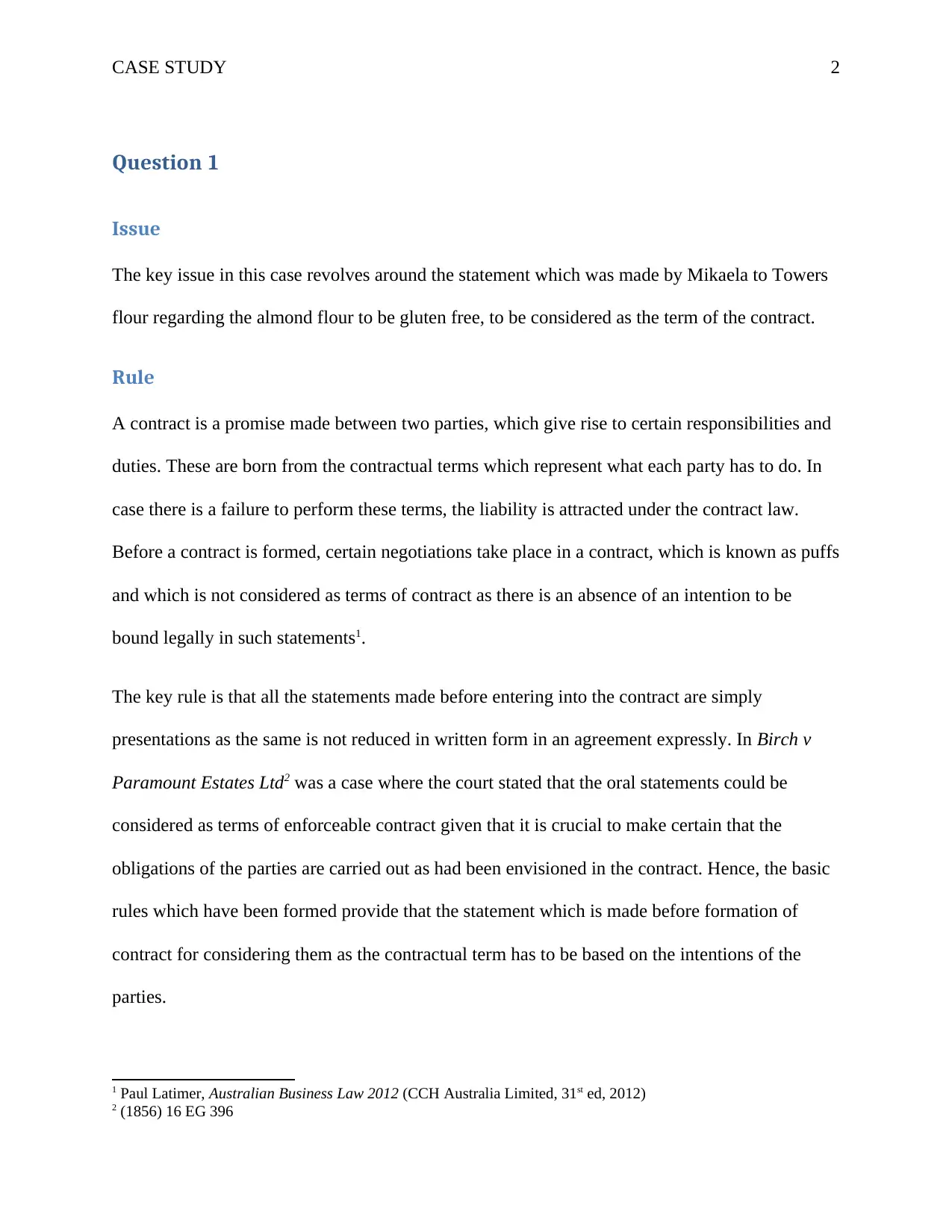
CASE STUDY 2
Question 1
Issue
The key issue in this case revolves around the statement which was made by Mikaela to Towers
flour regarding the almond flour to be gluten free, to be considered as the term of the contract.
Rule
A contract is a promise made between two parties, which give rise to certain responsibilities and
duties. These are born from the contractual terms which represent what each party has to do. In
case there is a failure to perform these terms, the liability is attracted under the contract law.
Before a contract is formed, certain negotiations take place in a contract, which is known as puffs
and which is not considered as terms of contract as there is an absence of an intention to be
bound legally in such statements1.
The key rule is that all the statements made before entering into the contract are simply
presentations as the same is not reduced in written form in an agreement expressly. In Birch v
Paramount Estates Ltd2 was a case where the court stated that the oral statements could be
considered as terms of enforceable contract given that it is crucial to make certain that the
obligations of the parties are carried out as had been envisioned in the contract. Hence, the basic
rules which have been formed provide that the statement which is made before formation of
contract for considering them as the contractual term has to be based on the intentions of the
parties.
1 Paul Latimer, Australian Business Law 2012 (CCH Australia Limited, 31st ed, 2012)
2 (1856) 16 EG 396
Question 1
Issue
The key issue in this case revolves around the statement which was made by Mikaela to Towers
flour regarding the almond flour to be gluten free, to be considered as the term of the contract.
Rule
A contract is a promise made between two parties, which give rise to certain responsibilities and
duties. These are born from the contractual terms which represent what each party has to do. In
case there is a failure to perform these terms, the liability is attracted under the contract law.
Before a contract is formed, certain negotiations take place in a contract, which is known as puffs
and which is not considered as terms of contract as there is an absence of an intention to be
bound legally in such statements1.
The key rule is that all the statements made before entering into the contract are simply
presentations as the same is not reduced in written form in an agreement expressly. In Birch v
Paramount Estates Ltd2 was a case where the court stated that the oral statements could be
considered as terms of enforceable contract given that it is crucial to make certain that the
obligations of the parties are carried out as had been envisioned in the contract. Hence, the basic
rules which have been formed provide that the statement which is made before formation of
contract for considering them as the contractual term has to be based on the intentions of the
parties.
1 Paul Latimer, Australian Business Law 2012 (CCH Australia Limited, 31st ed, 2012)
2 (1856) 16 EG 396
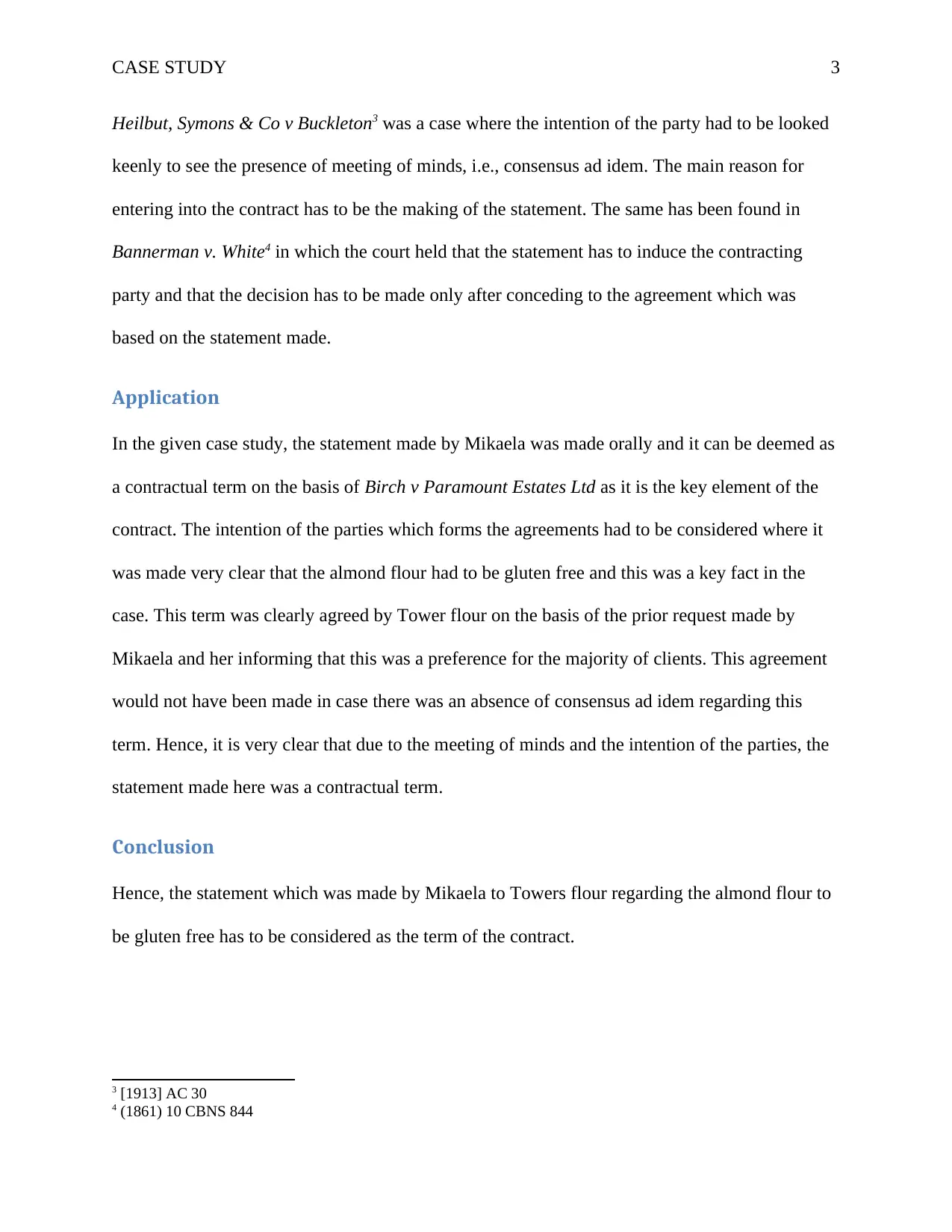
CASE STUDY 3
Heilbut, Symons & Co v Buckleton3 was a case where the intention of the party had to be looked
keenly to see the presence of meeting of minds, i.e., consensus ad idem. The main reason for
entering into the contract has to be the making of the statement. The same has been found in
Bannerman v. White4 in which the court held that the statement has to induce the contracting
party and that the decision has to be made only after conceding to the agreement which was
based on the statement made.
Application
In the given case study, the statement made by Mikaela was made orally and it can be deemed as
a contractual term on the basis of Birch v Paramount Estates Ltd as it is the key element of the
contract. The intention of the parties which forms the agreements had to be considered where it
was made very clear that the almond flour had to be gluten free and this was a key fact in the
case. This term was clearly agreed by Tower flour on the basis of the prior request made by
Mikaela and her informing that this was a preference for the majority of clients. This agreement
would not have been made in case there was an absence of consensus ad idem regarding this
term. Hence, it is very clear that due to the meeting of minds and the intention of the parties, the
statement made here was a contractual term.
Conclusion
Hence, the statement which was made by Mikaela to Towers flour regarding the almond flour to
be gluten free has to be considered as the term of the contract.
3 [1913] AC 30
4 (1861) 10 CBNS 844
Heilbut, Symons & Co v Buckleton3 was a case where the intention of the party had to be looked
keenly to see the presence of meeting of minds, i.e., consensus ad idem. The main reason for
entering into the contract has to be the making of the statement. The same has been found in
Bannerman v. White4 in which the court held that the statement has to induce the contracting
party and that the decision has to be made only after conceding to the agreement which was
based on the statement made.
Application
In the given case study, the statement made by Mikaela was made orally and it can be deemed as
a contractual term on the basis of Birch v Paramount Estates Ltd as it is the key element of the
contract. The intention of the parties which forms the agreements had to be considered where it
was made very clear that the almond flour had to be gluten free and this was a key fact in the
case. This term was clearly agreed by Tower flour on the basis of the prior request made by
Mikaela and her informing that this was a preference for the majority of clients. This agreement
would not have been made in case there was an absence of consensus ad idem regarding this
term. Hence, it is very clear that due to the meeting of minds and the intention of the parties, the
statement made here was a contractual term.
Conclusion
Hence, the statement which was made by Mikaela to Towers flour regarding the almond flour to
be gluten free has to be considered as the term of the contract.
3 [1913] AC 30
4 (1861) 10 CBNS 844
⊘ This is a preview!⊘
Do you want full access?
Subscribe today to unlock all pages.

Trusted by 1+ million students worldwide
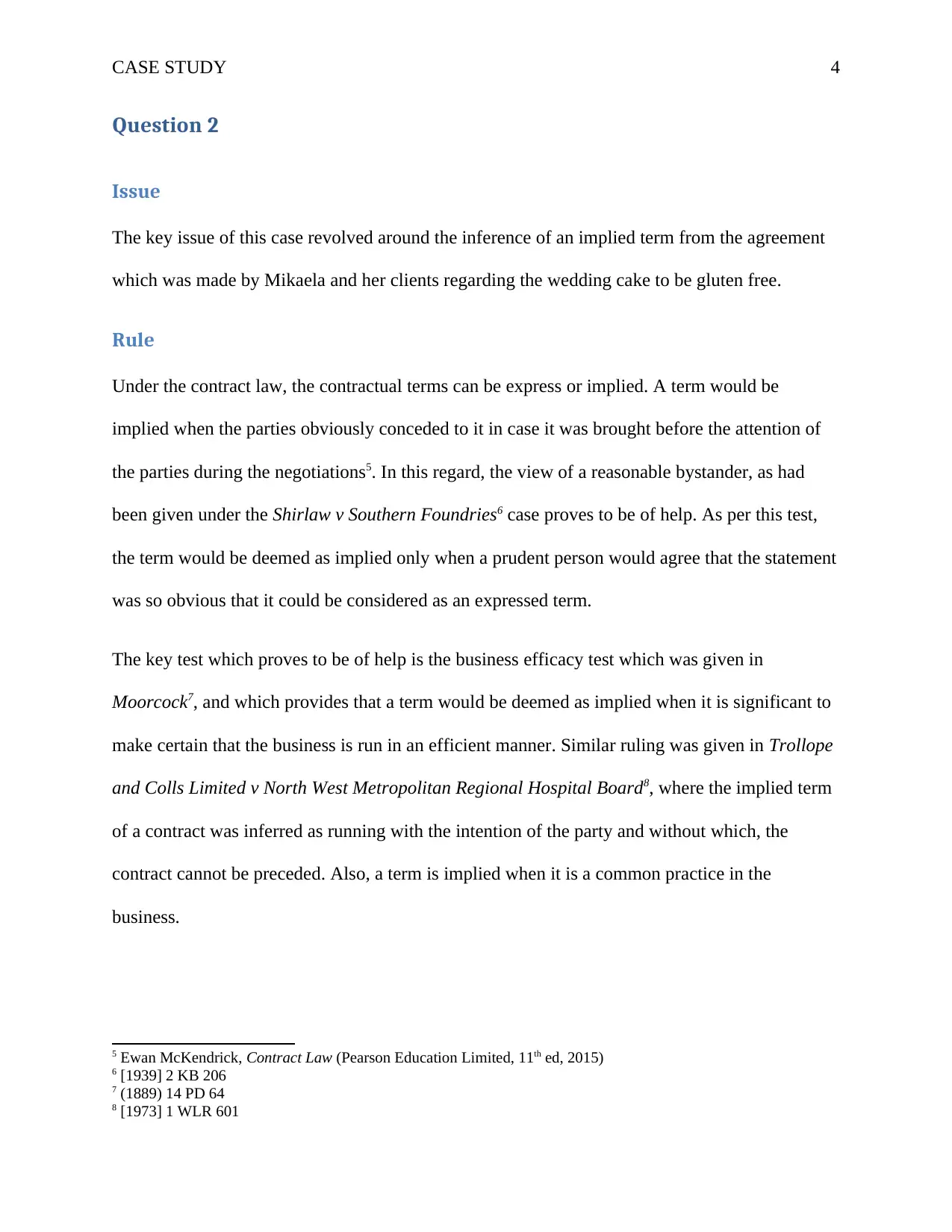
CASE STUDY 4
Question 2
Issue
The key issue of this case revolved around the inference of an implied term from the agreement
which was made by Mikaela and her clients regarding the wedding cake to be gluten free.
Rule
Under the contract law, the contractual terms can be express or implied. A term would be
implied when the parties obviously conceded to it in case it was brought before the attention of
the parties during the negotiations5. In this regard, the view of a reasonable bystander, as had
been given under the Shirlaw v Southern Foundries6 case proves to be of help. As per this test,
the term would be deemed as implied only when a prudent person would agree that the statement
was so obvious that it could be considered as an expressed term.
The key test which proves to be of help is the business efficacy test which was given in
Moorcock7, and which provides that a term would be deemed as implied when it is significant to
make certain that the business is run in an efficient manner. Similar ruling was given in Trollope
and Colls Limited v North West Metropolitan Regional Hospital Board8, where the implied term
of a contract was inferred as running with the intention of the party and without which, the
contract cannot be preceded. Also, a term is implied when it is a common practice in the
business.
5 Ewan McKendrick, Contract Law (Pearson Education Limited, 11th ed, 2015)
6 [1939] 2 KB 206
7 (1889) 14 PD 64
8 [1973] 1 WLR 601
Question 2
Issue
The key issue of this case revolved around the inference of an implied term from the agreement
which was made by Mikaela and her clients regarding the wedding cake to be gluten free.
Rule
Under the contract law, the contractual terms can be express or implied. A term would be
implied when the parties obviously conceded to it in case it was brought before the attention of
the parties during the negotiations5. In this regard, the view of a reasonable bystander, as had
been given under the Shirlaw v Southern Foundries6 case proves to be of help. As per this test,
the term would be deemed as implied only when a prudent person would agree that the statement
was so obvious that it could be considered as an expressed term.
The key test which proves to be of help is the business efficacy test which was given in
Moorcock7, and which provides that a term would be deemed as implied when it is significant to
make certain that the business is run in an efficient manner. Similar ruling was given in Trollope
and Colls Limited v North West Metropolitan Regional Hospital Board8, where the implied term
of a contract was inferred as running with the intention of the party and without which, the
contract cannot be preceded. Also, a term is implied when it is a common practice in the
business.
5 Ewan McKendrick, Contract Law (Pearson Education Limited, 11th ed, 2015)
6 [1939] 2 KB 206
7 (1889) 14 PD 64
8 [1973] 1 WLR 601
Paraphrase This Document
Need a fresh take? Get an instant paraphrase of this document with our AI Paraphraser
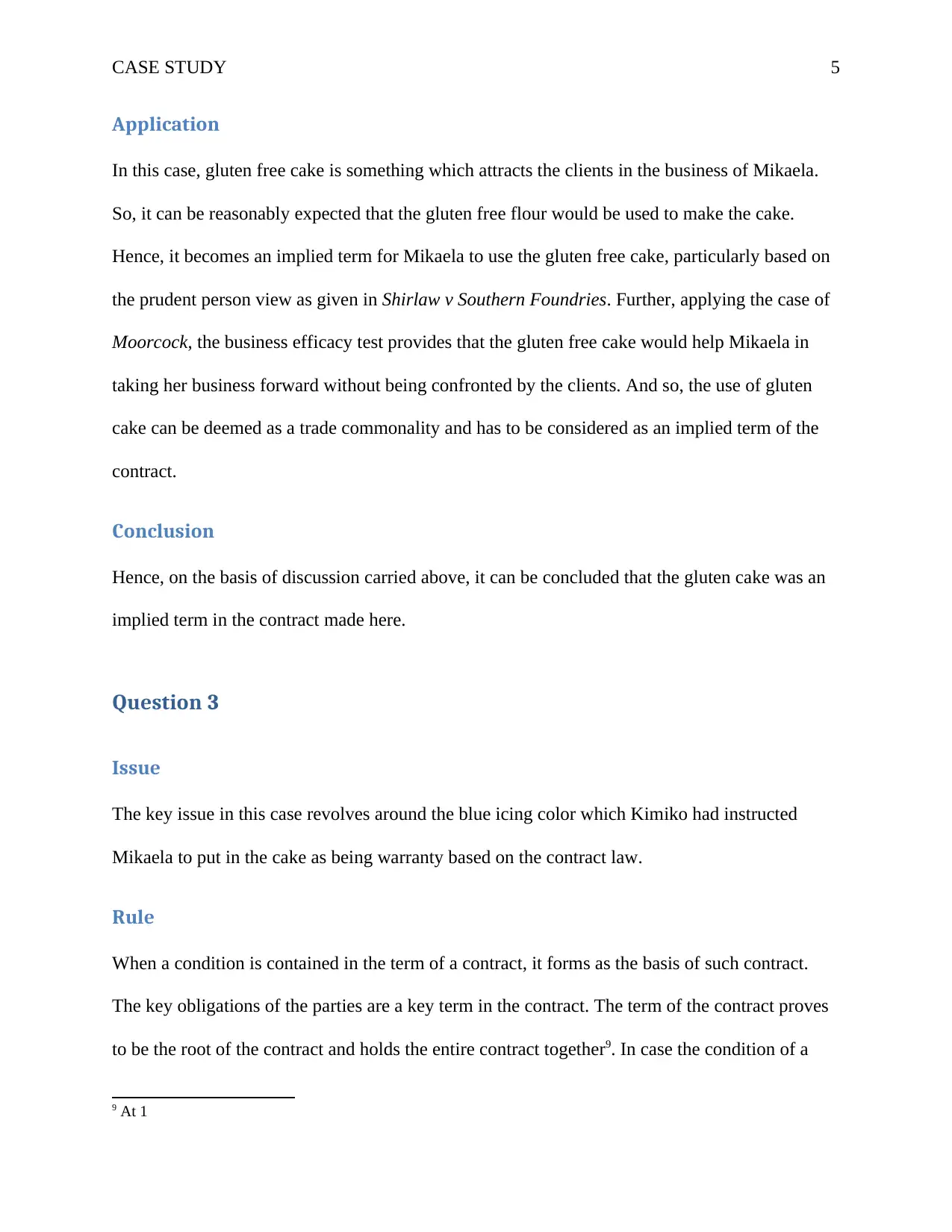
CASE STUDY 5
Application
In this case, gluten free cake is something which attracts the clients in the business of Mikaela.
So, it can be reasonably expected that the gluten free flour would be used to make the cake.
Hence, it becomes an implied term for Mikaela to use the gluten free cake, particularly based on
the prudent person view as given in Shirlaw v Southern Foundries. Further, applying the case of
Moorcock, the business efficacy test provides that the gluten free cake would help Mikaela in
taking her business forward without being confronted by the clients. And so, the use of gluten
cake can be deemed as a trade commonality and has to be considered as an implied term of the
contract.
Conclusion
Hence, on the basis of discussion carried above, it can be concluded that the gluten cake was an
implied term in the contract made here.
Question 3
Issue
The key issue in this case revolves around the blue icing color which Kimiko had instructed
Mikaela to put in the cake as being warranty based on the contract law.
Rule
When a condition is contained in the term of a contract, it forms as the basis of such contract.
The key obligations of the parties are a key term in the contract. The term of the contract proves
to be the root of the contract and holds the entire contract together9. In case the condition of a
9 At 1
Application
In this case, gluten free cake is something which attracts the clients in the business of Mikaela.
So, it can be reasonably expected that the gluten free flour would be used to make the cake.
Hence, it becomes an implied term for Mikaela to use the gluten free cake, particularly based on
the prudent person view as given in Shirlaw v Southern Foundries. Further, applying the case of
Moorcock, the business efficacy test provides that the gluten free cake would help Mikaela in
taking her business forward without being confronted by the clients. And so, the use of gluten
cake can be deemed as a trade commonality and has to be considered as an implied term of the
contract.
Conclusion
Hence, on the basis of discussion carried above, it can be concluded that the gluten cake was an
implied term in the contract made here.
Question 3
Issue
The key issue in this case revolves around the blue icing color which Kimiko had instructed
Mikaela to put in the cake as being warranty based on the contract law.
Rule
When a condition is contained in the term of a contract, it forms as the basis of such contract.
The key obligations of the parties are a key term in the contract. The term of the contract proves
to be the root of the contract and holds the entire contract together9. In case the condition of a
9 At 1
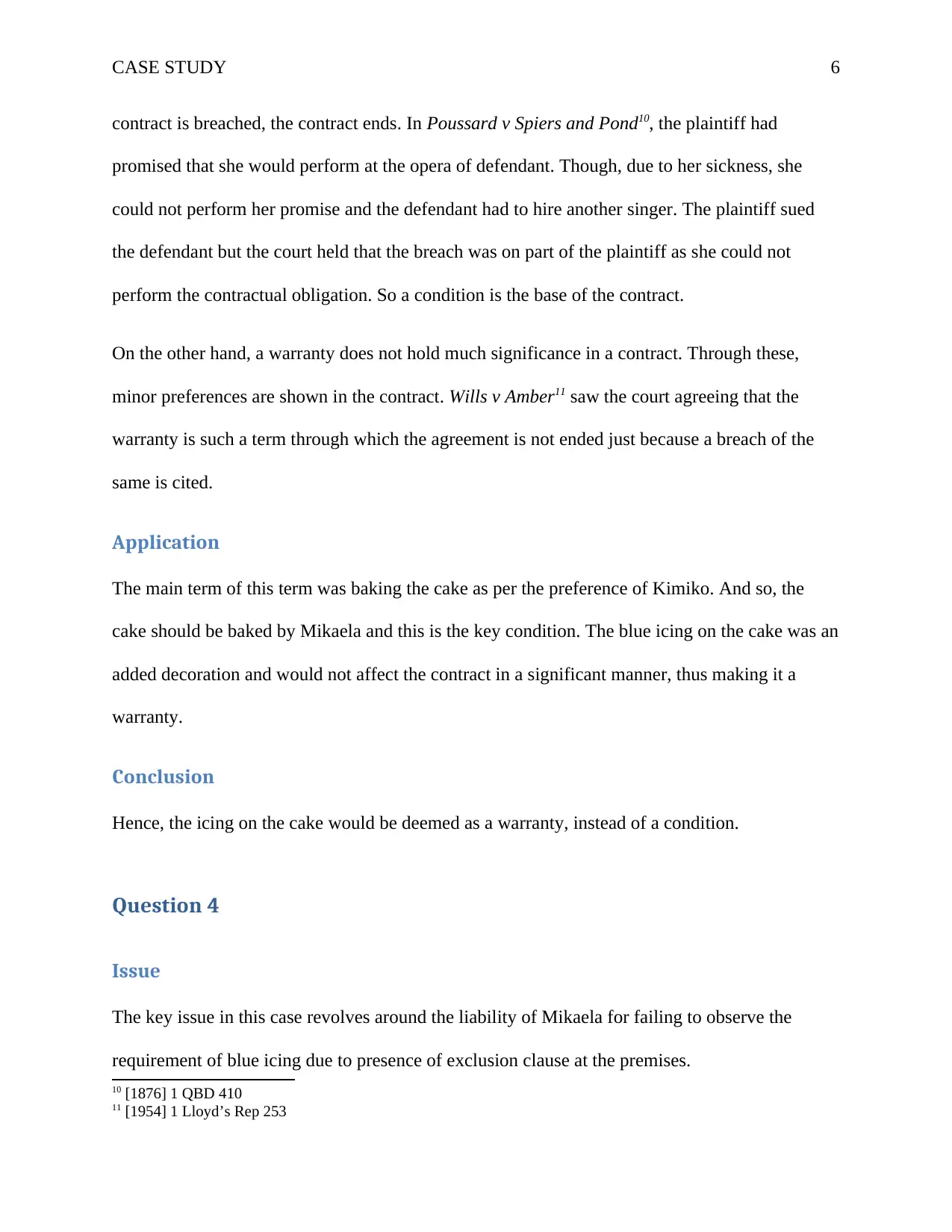
CASE STUDY 6
contract is breached, the contract ends. In Poussard v Spiers and Pond10, the plaintiff had
promised that she would perform at the opera of defendant. Though, due to her sickness, she
could not perform her promise and the defendant had to hire another singer. The plaintiff sued
the defendant but the court held that the breach was on part of the plaintiff as she could not
perform the contractual obligation. So a condition is the base of the contract.
On the other hand, a warranty does not hold much significance in a contract. Through these,
minor preferences are shown in the contract. Wills v Amber11 saw the court agreeing that the
warranty is such a term through which the agreement is not ended just because a breach of the
same is cited.
Application
The main term of this term was baking the cake as per the preference of Kimiko. And so, the
cake should be baked by Mikaela and this is the key condition. The blue icing on the cake was an
added decoration and would not affect the contract in a significant manner, thus making it a
warranty.
Conclusion
Hence, the icing on the cake would be deemed as a warranty, instead of a condition.
Question 4
Issue
The key issue in this case revolves around the liability of Mikaela for failing to observe the
requirement of blue icing due to presence of exclusion clause at the premises.
10 [1876] 1 QBD 410
11 [1954] 1 Lloyd’s Rep 253
contract is breached, the contract ends. In Poussard v Spiers and Pond10, the plaintiff had
promised that she would perform at the opera of defendant. Though, due to her sickness, she
could not perform her promise and the defendant had to hire another singer. The plaintiff sued
the defendant but the court held that the breach was on part of the plaintiff as she could not
perform the contractual obligation. So a condition is the base of the contract.
On the other hand, a warranty does not hold much significance in a contract. Through these,
minor preferences are shown in the contract. Wills v Amber11 saw the court agreeing that the
warranty is such a term through which the agreement is not ended just because a breach of the
same is cited.
Application
The main term of this term was baking the cake as per the preference of Kimiko. And so, the
cake should be baked by Mikaela and this is the key condition. The blue icing on the cake was an
added decoration and would not affect the contract in a significant manner, thus making it a
warranty.
Conclusion
Hence, the icing on the cake would be deemed as a warranty, instead of a condition.
Question 4
Issue
The key issue in this case revolves around the liability of Mikaela for failing to observe the
requirement of blue icing due to presence of exclusion clause at the premises.
10 [1876] 1 QBD 410
11 [1954] 1 Lloyd’s Rep 253
⊘ This is a preview!⊘
Do you want full access?
Subscribe today to unlock all pages.

Trusted by 1+ million students worldwide
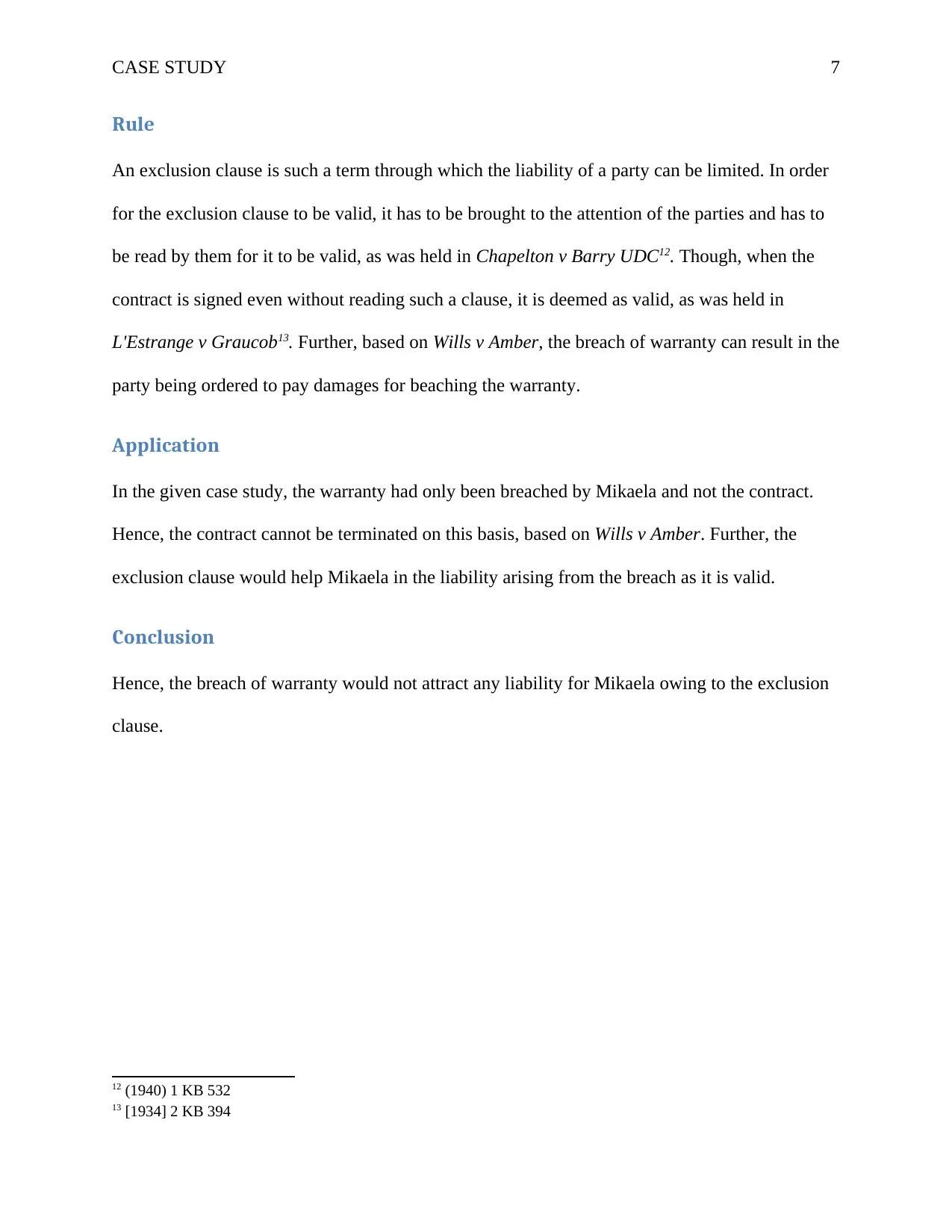
CASE STUDY 7
Rule
An exclusion clause is such a term through which the liability of a party can be limited. In order
for the exclusion clause to be valid, it has to be brought to the attention of the parties and has to
be read by them for it to be valid, as was held in Chapelton v Barry UDC12. Though, when the
contract is signed even without reading such a clause, it is deemed as valid, as was held in
L'Estrange v Graucob13. Further, based on Wills v Amber, the breach of warranty can result in the
party being ordered to pay damages for beaching the warranty.
Application
In the given case study, the warranty had only been breached by Mikaela and not the contract.
Hence, the contract cannot be terminated on this basis, based on Wills v Amber. Further, the
exclusion clause would help Mikaela in the liability arising from the breach as it is valid.
Conclusion
Hence, the breach of warranty would not attract any liability for Mikaela owing to the exclusion
clause.
12 (1940) 1 KB 532
13 [1934] 2 KB 394
Rule
An exclusion clause is such a term through which the liability of a party can be limited. In order
for the exclusion clause to be valid, it has to be brought to the attention of the parties and has to
be read by them for it to be valid, as was held in Chapelton v Barry UDC12. Though, when the
contract is signed even without reading such a clause, it is deemed as valid, as was held in
L'Estrange v Graucob13. Further, based on Wills v Amber, the breach of warranty can result in the
party being ordered to pay damages for beaching the warranty.
Application
In the given case study, the warranty had only been breached by Mikaela and not the contract.
Hence, the contract cannot be terminated on this basis, based on Wills v Amber. Further, the
exclusion clause would help Mikaela in the liability arising from the breach as it is valid.
Conclusion
Hence, the breach of warranty would not attract any liability for Mikaela owing to the exclusion
clause.
12 (1940) 1 KB 532
13 [1934] 2 KB 394
1 out of 7
Related Documents
Your All-in-One AI-Powered Toolkit for Academic Success.
+13062052269
info@desklib.com
Available 24*7 on WhatsApp / Email
![[object Object]](/_next/static/media/star-bottom.7253800d.svg)
Unlock your academic potential
Copyright © 2020–2026 A2Z Services. All Rights Reserved. Developed and managed by ZUCOL.





